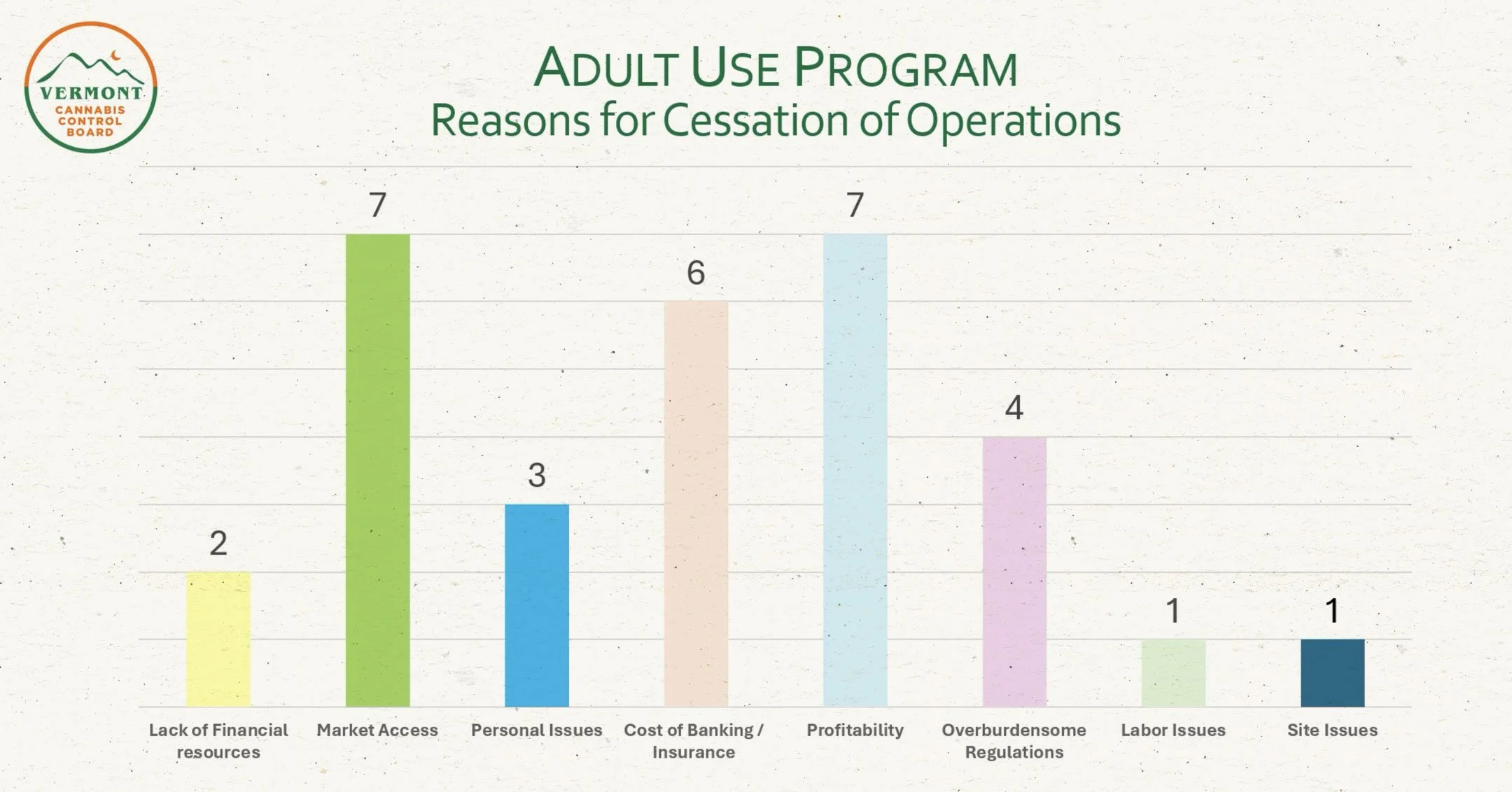CCB Board Meeting Brief Overview
On Wednesday, August 27, 2025, the Cannabis Control Board held its monthly meeting, approving sixty-three license renewals. There were no initially licensed businesses. Notably, the Board heard from several individuals during public comment requesting that it reopen the application window for retailer licenses. The Board also discussed its upcoming work directed by legislators in Act 56 (2025). According to the CCB, there are currently 605 active licenses in place.
A slide from the August 27, 2025, Executive Directors Report showing market access and profitability as leading reasons for exiting the market, as reported to the agency by exiting businesses.
“Of note in this discussion on Act 56 (2025), the Chair conveyed that minor fee reductions alone, while likely welcomed by licensees, will not significantly address the challenges and inequities licensees face, and that issues such as product registration reform and creating more opportunities for small cultivators to process and retail their own products would be more impactful. He continued that finding new pathways to market for producers is not new to the Board, expressing that this past legislative session, there wasn’t enough support to enact a farmers’ market run through a retailer as a reason to not seek direct sales for producers in the future. Commissioner Harris echoed similar remarks in the meeting. We want to take a moment to unpack this issue, as this sentiment does not fully align with the activities of the last legislative session.”
Meeting Overview
On Wednesday, August 27, 2025, the Cannabis Control Board (CCB) held a relatively brief Board meeting that featued unique public engagement during the public comment period.
During Chair Pepper’s opening remarks, he highlighted a recent CCB Special Meeting that kicked off its new enhanced budtender training course, a requirement for the new Medical-Use Endorsement (MUE) retailer license. The CCB contracted services with Cannify for this new training. The course will be offered for free to all registered employees, even those not currently working at a MUE, at scheduled intervals throughout the remainder of this year and 2026. The Chair expressed that upon completion of the course, the employee will be provided a certificate and credentialed to work at a MUE, and that there will be more details on the new training course in the coming weeks.
After the opening remarks, the Chair moved into the public comment period, where several commenters, including a staff member from VGA, urged the CCB to reopen the application window for the retailer license. This groundswell of organized grassroots advocacy during a routine CCB Board meeting is unique, underscoring a strong desire from within the industry to address the shortage of available shelf space and evenly distributed retail shops throughout the state as a means to maintain a healthy and viable market. The thoughtful comments raised issues such as fairness, the sharp decline in licensed cultivators, and the mismatch of not enough licensed retailers to meet producer and consumer demand. We urge you to watch the public comment period of the CCB meeting on YouTube, at the start of the meeting, to hear the voices from the industry on this important issue.
After the public comment period ended, Executive Director Fitch presented the monthly Executive Director report. This month's report reveals a steady decline in active licenses over the past several months, with market access and profitability being the primary reasons for ceasing operations. Additionally, there is a new trend emerging in the CCB's data showing that cultivators are downsizing their tier. Executive Director Fitch also announced that the upcoming CCB Peer-Networking event will focus on the MUE, with the date and time to be announced soon.
Below are some noteworthy data sets from this month's Executive Director report:
There are 605 active total licenses;
384 active total Cultivators, a decrease of 10 licenses from last month;
2 Integrated, a decrease of 1 license from last month;
95 Manufacturers;
111 Retailers, an increase of 1 license from last month (which was an Integrated licensee converting their Integrated license into a Retailer license, so no real net gain here) ;
2 Testing Labs;
8 Wholesalers;
4 Propagators, an increase of 1 license from last month, and;
366 Standard licensees, a decrease of 6 from last month, 142 Economic Empowerment licensees, a decrease of 7 from last month, and 97 Social Equity licensees, a decrease of 2 from last month.
Act 56 (2025) Discussion
Following Executive Director Fitch's report and presentation, Chair Pepper led the Board in a discussion on the Act 56 (2025) legislative report. Learn more about the new law with our new Guide to Act 56 (2025). The Chair overviewed the new reporting requirements as directed by lawmakers, including adjusting fees to better align with the General Assembly's intent to encourage participation in the regulated market by small local farmers and Social Equity applicants. Additionally, the CCB is charged with determining whether a portion of the cannabis excise tax should be allocated to the Cannabis Business Development Fund and the Land Access and Opportunity Board.
The Chair detailed that the fee charge was requested by the House Committee on Ways and Means and the Senate Committee on Finance, and the excise tax charge was requested by the Senate Committee on Economic Development, Housing, and General Affairs, but the two charges are linked and overlap. Chair Pepper expressed that he will take the lead on the fee work, and Commissioner Hulburd and Harris will take the lead on the excise tax work.
Of note in this discussion on Act 56 (2025), the Chair conveyed that minor fee reductions alone, while likely welcomed by licensees, will not significantly address the challenges and inequities licensees face, and that issues such as product registration reform and creating more opportunities for small cultivators to process and retail their own products would be more impactful. He continued that finding new pathways to market for producers is not new to the Board, expressing that this past legislative session, there wasn't enough support to enact a farmers' market run through a retailer as a reason to not seek direct sales for producers in the future. Commissioner Harris echoed similar remarks in the meeting. We want to take a moment to unpack this issue, as this sentiment does not fully align with the activities of the last legislative session.
During the past legislative session, there was significant support for allowing direct sales by small producers through a farmers market concept that we developed in collaboration with the industry. This support came from a broad coalition of organizations, advocates, and lawmakers. However, the issue did not progress after Chair Clarkson of the Senate Committee on Economic Development, Housing, and General Affairs asked the Board in committee whether they supported adding the language to Bill H.321. The Board declined to endorse the widely supported direct-sales farmers market amendment, suggesting that including it would likely result in a veto from the Governor. A duty of our work is to bring transparency and sunlight to the process. Gatekeeping legislative affairs, such as this, especially popular reforms like a farmers market, by protecting perceived opposition, prevents the issue from being realized. This type of behavior undermines democracy by disarming stakeholders' ability to address opposition and prevents testing the political viability of an issue. The failure to pass an off-site retailer sales concept does not have a relationship or reflect the political viability of establishing direct sales market channels. We hope to work more closely with the agency in future legislative sessions to more effectively address market flaws and better reflect the interests of Vermonters.
Meeting and Resource Links
Watch the August 27, 2025 Board Meeting on YouTube.
Read the August 27, 2025 Executive Director report (PDF).
Watch the August 26, 2025 CCB Special Meeting event on enhanced budtender education.

